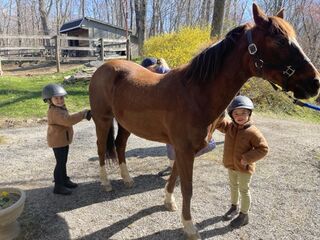Understanding Twins
The Struggles of Twin Families During the Pandemic
What helps your home return to relative normalcy.
Posted May 2, 2022 Reviewed by Gary Drevitch

“I will never complain about going to school or ask to stay home again.” —Vivian, 5th grader
Twins and their families have had their lives seriously disrupted by the pandemic. Although I am a twin, I say this as an outsider who consults with parents about helping their twin children get along with one another and also helping each twin define their own sense of self.
Since the beginning of the pandemic, I have gotten phone calls and emails from caring parents about how to understand and reduce the verbal and physical abuse that their children intensely use against each other. Twins who were able to support one another and work on projects together before COVID-19 have been having a hard time getting along. Parents are alarmed by their children's bickering, which can devolve into deeply-felt dramatic arguments.
Parents have shared concerns like, “Now (since COVID) the slightest disagreement over what to do next can turn into a horrific fight.” Regression to a much earlier age is a way of describing what the current twin disagreements look like. Truly bright 10-year-old twins can act like they are barely five. An easy answer is too much time spent together. What follows are more complete answers.
Causal Factors in Increased Twin Fighting
Parents as Teachers. Obviously, the fear that children have experienced in having their lives disrupted by COVID restrictions cannot be minimized. The changes in their “standard” lives from in-person schooling to homeschooling has had long-lasting effects for children who may not have been able to learn as well online as they would have in person. Most parents are not teachers and had a steep learning curve when it came to teaching their own children. As well, parents were not educated in curriculum and instruction as experienced classroom teachers have been. More often than not, children found their parents either too strict or too easygoing. Problems arose in teaching and learning when twin children had to listen to a parent as if they were a classroom teacher.
Overwhelming Fear of COVID. Children and teenagers were exposed to too much frightening information about the dangers of the virus by parents, teachers, relatives, and the media. At this point in time, it is impossible to predict the after-effects of the lockdowns and the over-stimulating predictions and warnings of possible danger. (In this category I add the use of masks and social distancing as contributing to fear on an ongoing basis.)
Lack of Reliable and Spontaneous Social Interactions. Twins had each other to play with and to communicate with all of the time but restrictions on playing with other children created social and emotional turmoil and confusion for twins. Relying on their twin all of the time led to more fighting and actual abusive physical interactions. Like a married couple who are always together, twins felt trapped with each other.
Family and extended family social events were also cut back because of the fear of spreading the virus. This was perhaps even more difficult for children used to seeing grandparents, aunts, and uncles regularly. Older relatives and friends also suffered from loneliness. Obviously, parents were given extra responsibilities and had to deal with children's unhappiness and anger and new schooling circumstances.
What to Do to Recover from the Pandemic
First, be sensitive to your children's fears and anger about what they have been through and all of the changes in their lives. They may not be happy that they have to get dressed in the morning and get to school on time. They have enjoyed the leisure of dping schoolwork in their sweats or pajamas. Also they have learned to listen to the teacher while playing video games or talking to friends. Having to pay attention with no distractions will be a real adjustment. Listen to their complaints but do not allow them to continue sneaky “get out of concentrating on schoolwork” games with and without friends.
At this time in their lives, try to be sensitive to their fears and concerns about their well-being and the well-being of others. I have seen parents make light of children's fears which only makes their fearfulness worse. Add in social activities that will challenge them and expose them to new experiences such as theatre, art, music, sports, and horseback riding — whatever is possible. Encourage play dates and family events. If problems persist related to school or friends seek out professional help from a mental health professional.
Lastly, for now talk with your children about how proud you are of their cooperation and ability to conform to the restrictions imposed by COVID.
Hands-on Ideas
- Friendships should be encouraged.
- Have more family events such as cooking, gardening, and doing jigsaw puzzles.
- Limit online activities to those that are challenging intellectually.




